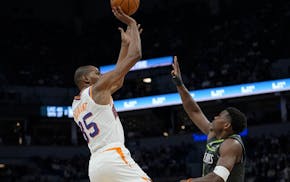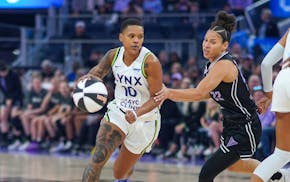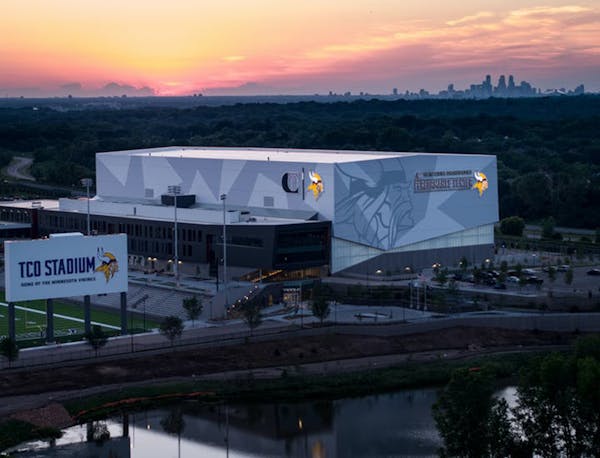The first days of training camp — regarded by veteran players as drudgery, and by fans as the start of a new year — have, in recent seasons, been a chance for the Vikings to bathe in the optimism of the moment by making grand pronouncements about their future.
Mike Zimmer's first camp in 2014 brought a new deal for tight end Kyle Rudolph. The team announced a contract extension for kicker Blair Walsh on the first weekend of its 2015 camp. The 2016 camp started with a two-year extension for Zimmer. Their 2017 camp began with a flurry — new deals for Everson Griffen, Xavier Rhodes and Linval Joseph — and 2018 was highlighted by a five-year contract for Stefon Diggs.
The Vikings' 2020 camp, expected to begin next month, already may have a subdued feel because of the novel coronavirus that turned the team's spring practices into a virtual offseason program. But their practice of using the beginning of training camp as a stage to announce new deals could continue, Monday's hints of friction between the Vikings and running back Dalvin Cook notwithstanding.
Cook will be a free agent next spring, and his desire for a big contract has been both an open secret and a logical gambit heading into the 2020 season. His camp turned up the temperature in negotiations Monday; an NFL source confirmed Cook has pulled out of the final stages of the Vikings' spring program and plans to hold out during training camp unless he receives a multiyear deal.
Cook is coming off a trip to the Pro Bowl, after needing just 14 games to post the 10th-best total yards from scrimmage (1,654) in Vikings history. The team doubled down on its commitment to a scheme that features Cook by making Gary Kubiak its new offensive coordinator.
The four-year, $64 million deal the Panthers recently gave Christian McCaffrey buoyed running backs such as Cook, New Orleans' Alvin Kamara, Green Bay's Aaron Jones and Tennessee's Derrick Henry, who are looking for their own paydays at a position that no longer offers many of them.
Cook's best chance to get paid is now, when he's still two months from his 25th birthday, emerging as a locker room leader and asserting himself as one of the Vikings' most indispensable players.
Vikings and more: Sign up for Star Tribune sports newsletters
The makeup of the team's running back room, and the constraints of the NFL's new collective bargaining agreement, make it likely cooler heads will prevail by the start of training camp, and General Manager Rick Spielman will be lauding Cook in a celebratory news conference, even if they can't hug for the cameras.
The Vikings used a third-round pick on Alexander Mattison a year ago, giving them a complement to Cook and a capable option in their zone scheme. Mattison gave the Vikings perhaps even more than they'd expected, averaging 4.6 yards per carry on his way to 462 rushing yards in 13 games.
Some in the analytics community would point to Mattison's productivity, his age (he turns 22 next week) and his price (a cap figure that doesn't eclipse $1 million until 2022) as reasons why the Vikings should thank Cook for his service after this season and let him go.
Running backs rarely command the kind of money the Vikings gave Adrian Peterson in 2011; McCaffrey's 1,000-yard seasons as both a runner and receiver last year might make him the exception, but his deal is only fully guaranteed through 2021. Melvin Gordon got only $16 million over two years from the Broncos this spring.
ESPN's Adam Schefter reported that Cook was seeking around $13 million per year, which would put him next to the Texans' David Johnson and the Jets' Le'Veon Bell in terms of average annual value.
Cook has lost some leverage in a holdout. Because he was drafted in the second round in 2017 and not the first, he didn't get a fifth-year option. And the new CBA says players who don't report for the first day of training camp will not receive an accrued season, even if they show up later. That would leave Cook with just three accrued seasons when his contract expires, making him a restricted (not an unrestricted) free agent in March and giving the Vikings the option to keep him at a reduced price.
Coronavirus concerns could affect the Vikings' negotiations with Cook in one significant way: if the NFL plays games without fans in the stands this fall and a drop in league revenue leads to a lower salary cap in 2021. Teams like the Vikings, who already have $182 million in cap commitments next year, could be scrambling to get under the cap.
Still, despite what was said Monday, there's a sensible wager to be made that if training camp opens on time next month, the Vikings and Cook will mark the occasion with a festive announcement that's become almost an annual tradition.

Souhan: Will the Timberwolves trade for Kevin Durant? Should they?

Lynx improve to 7-0 with strong second half vs. expansion Valkyries

Twins lose in walk-off against Seattle for second straight game
Three-goal outburst in second half helps Minnesota United to rare victory in Seattle

